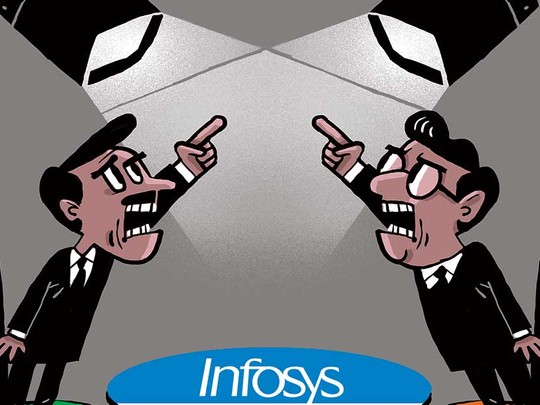
By Bakul Gala, Special to Gulf News
I didn’t know that as with Hollywood movies, there are sequels in India’s corporate world too. That’s until the Infosys slugfest happened.
The spat between ex-founders, CEO, board members and key minority shareholders created a sense of deja vu as the mind went back to $100 billion (Dh367.3 billion) controlling stakes war between Ratan Tata and Cyrus Mistry. In the case of Hollywood there is a decent gap between sequels, thereby allowing the viewer some breathing space and keep their interest levels intact.
But in India Inc, the Tata-Mistry fight had barely died down and in rapid succession came another iconic brand’s linen being washed in the open.
Nasdaq-listed Infosys, India’s IT bellwether with a market capitalisation of $31 billion is witnessing acute challenges in its succession planning. The 36-year old Infosys — which did not have a computer for its first two years — is fighting a no-holds barred internal battle where everybody is going to be a loser. Infosys which almost wound up in 1989 (since the business wasn’t lucrative enough) is going through its worst ever existential crisis, with digital upstarts, artificial intelligence and automation eating into the traditional business of IT services.
Doomsayers aside, Infosys is known to rise up like a phoenix every time it is battered and bruised. This time too it will emerge stronger and more powerful. After all, its 200,000 employees and $10.21 billion in revenues are its core strengths.
However, there are at least seven lessons that conglomerates and companies need to be mindful of while analysing what went wrong at Infosys, which is among the Top 10 companies by market capitalisation on the Bombay Stock Exchange.
Dr Vishal Sikka knows it, but dear readers may not know. Men and women who take their careers seriously and have set their goals to become a CEO, managing director or chairman ought to know this beforehand.
It is extremely lonely at the top. You don’t realise it unless you experience it — there are no friends and you are mostly surrounded by hostile colleagues, unhappy customers and aggressive board members.
Oh yes, CEOs have feelings, they breathe the same air you and I do. Thus CEOs are gullible and prone to mistakes exactly the way a layman is. The only difference is that he should be capable of foreseeing it and it is expected of him to handle tough situations.
The board of directors are always ready to jump ship and as a whole the board can be highly dysfunctional. Again, they are neither your friends nor foes, but plain opportunists. These guys can do a complete volte-face and they don’t have a mind of their own... rather they have a “collective” mind.
Infosys was considered to be the epitome of moral values and built on corporate governance of the highest order. Such a halo doesn’t hold for too long and that it is transient is evident from the latest developments.
Today, there is no such thing called a “secure job”. Surely not for chairpersons, MDs and CEOs. Average CEO tenures have progressively reduced from five years to less than two. Sikka’s tenure is a new low of 19 months. Both N.R. Narayan Murthy, Infosys’ founder, and Sikka have their own self-esteem that got inadvertently translated into egos. One man’s self-esteem can be perceived by the other as his ego. The former wants Infosys to retain its high levels of corporate governance at any cost while Sikka wants to fix the growth issues at any cost. After all he laid down a vision of revenues of $20 billion in 2021.
Both had to protect their turf, come what may.
India Inc is facing the dichotomy of growth and control — in a country where most companies have set targets of doubling revenues every three years and where senior management is either ageing or requires sifting. There is a growing schism at the top.
After the Tata and Infosys episodes, all eyes are set on the $16 billion revenue generator L&T, where Chairman A.M. Naik is grooming his heir, S.N. Subrahmanyan. Watch this space.
The writer is Director of the Brandmark Group.












